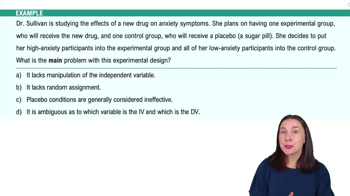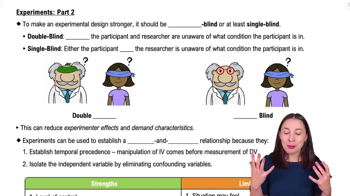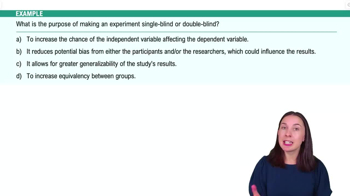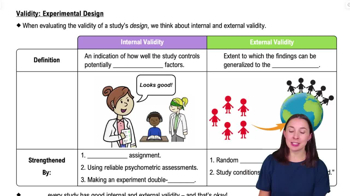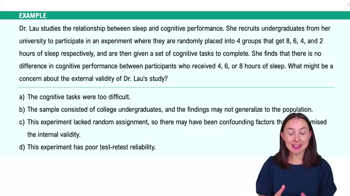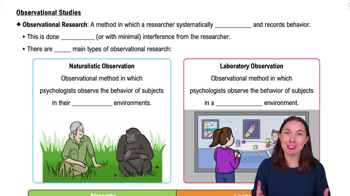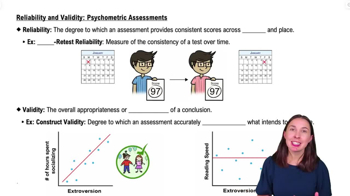Table of contents
- 1. Introduction to Psychology1h 43m
- 2. Psychology Research2h 20m
- 3. Biological Psychology2h 41m
- 4. Sensation and Perception28m
- 5. Consciousness and Sleep32m
- 6. Learning41m
- 7. Memory34m
- 8. Cognition37m
- 9. Emotion and Motivation35m
- 10. Developmental Psychology33m
- 11. Personality48m
- 12. Social Psychology41m
- 13. Stress and Health41m
- 14. Psychological Disorders44m
- 15. Treatment47m
2. Psychology Research
Intro to Research Methods
Struggling with Psychology?
Join thousands of students who trust us to help them ace their exams!Watch the first videoMultiple Choice
Which of the following is true about psychological tests?
A
They are standardized, meaning they are administered and scored using specific procedures.
B
They only measure cognitive skills (e.g., IQ, memory, executive function).
C
They tend to be highly subjective.
D
They allow the researcher to improvise and be flexible with each participant.
 Verified step by step guidance
Verified step by step guidance1
Understand the concept of psychological tests: Psychological tests are tools used to measure various aspects of human behavior and mental processes. They can assess cognitive abilities, personality traits, emotional functioning, and more.
Recognize the importance of standardization: Standardization refers to the consistent administration and scoring of tests. This ensures that the test results are reliable and valid across different individuals and settings.
Differentiate between cognitive and non-cognitive measures: While some psychological tests measure cognitive skills like IQ and memory, others assess non-cognitive aspects such as personality, attitudes, and emotional states.
Consider the objectivity of psychological tests: Psychological tests are designed to be objective, meaning they rely on standardized procedures and scoring to minimize subjective bias.
Evaluate the flexibility in test administration: Standardized tests require strict adherence to specific procedures, limiting the ability of researchers to improvise or be flexible with participants during the test administration.

 1:46m
1:46mWatch next
Master Roadmap of the Lesson with a bite sized video explanation from Hannah Gordils
Start learningRelated Videos
Related Practice










